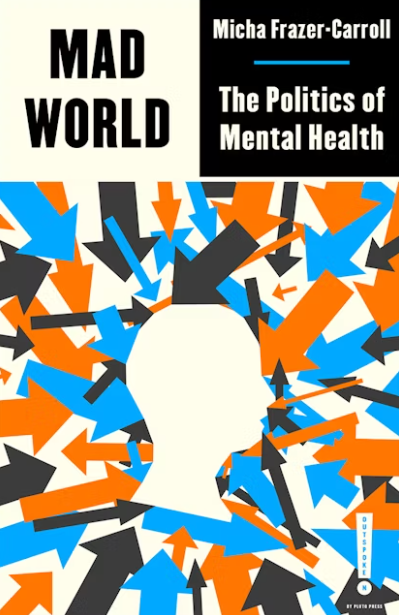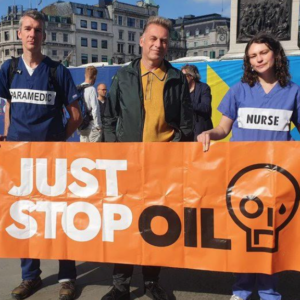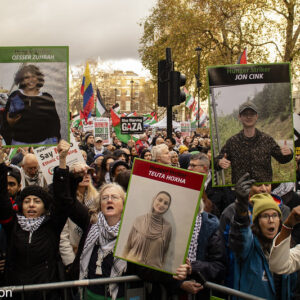Revolutionaries need many reminders that this miserable world is the source of much of the distress that we feel as individuals, and feel to be deep down inside us as if they are natural inevitable biological process. This book, Mad World: The Politics of Mental Health by Micha Frazer-Carroll, published this month by Pluto Press, is one such reminder, and is also an accessible overview of key debates in links between radical mental health and anti-capitalist politics.
Intersectional
We need reminders, and new updated introductions and overviews of this kind because the shape of revolutionary politics changes, with changes in struggle and the emergence of new forces for collectively mobilising against the individualisation of mental distress. This nicely-written book covers all the bases, working from individual experience – Frazer-Carroll starts with an account of her own breakdown, “a time in which I went mad”, and includes accounts from discussions she has had with a range of mental health activists – and carefully connects with decolonial, disability and queer politics.
“We need reminders, and new updated introductions and overviews of this kind because the shape of revolutionary politics changes, with changes in struggle and the emergence of new forces for collectively mobilising against the individualisation of mental distress.”
The key question that frames her account is “How, then, do we take such alienating and debilitating experiences and turn them outwards to politicise them?” She begins with the current context in which depression has become the leading global cause of disability, and makes the point that such is the level of alienation, exploitation and oppression under contemporary capitalism that we are only able to survive by “dissociating” in some way, cutting ourselves off and protecting ourselves.
“The key question that frames her account is ‘How, then, do we take such alienating and debilitating experiences and turn them outwards to politicise them?'”
Under capitalism we are not only individualised, separated from each other, but it is drummed into us over and again that we “own” what we experience as if it is a kind of property. Against that, she insists that there is no one alternative; our different experiences of distress mean that we must “hold space for lots of different conceptualisations”.
Mental illness and care
She grasps the thorny problem of naming this distress by choosing to refer to “Madness/Mental Illness” throughout the book, which is fine, because it is clear that she knows what she is doing with this, opening the way to the many different challenges to medical psychiatric treatments.
There is an interesting historical grounding for understanding the formation of “asylums” and their transformation after the 1930 Mental Treatment Act into “mental hospitals” and then their closure under neoliberal attempts to embed treatment in “community care”. This history, and the remains of those old institutions are around us, she says; “in the ground beneath our feet”.
In Britain two in every five GP appointments are about mental health, there are a million people on NHS waiting lists wanting help now, and this leads to contradictory policy changes and media discussion; at one moment we are told that people who have different experiences of the world are dangerous, to be feared, and at the next moment we are told that distress is normal and inevitable, with personal tales by Tory politicians, for example, who turn “mental health” into something that is modelled on “the bodyminds of white, middle class, able-bodied and ‘recovered’ people”.
In Britain two in every five GP appointments are about mental health, there are a million people on NHS waiting lists wanting help now, and this leads to contradictory policy changes and media discussion
There is a degree of hypocrisy in this “two tier” approach in which, Frazer-Carroll points out, “Even Winston Churchill, who used the ‘black dog’ as a euphemism for his depression, called for the introduction of forced labour camps for ‘mental defectives’”.
There are two arguments threading their way through the book. One is that the distinction between the “biological” and the “social” is an “artificial binary”. The other is that, as Frazer-Carroll puts it, “We should resist the urge to authoritatively declare what mental health is and how we must know it”. What we do know is that most forms of diagnosis and treatment are infused with racist, sexist and ablest assumptions.
This history ranges from the diagnosis back in 1851 of slaves running away from plantations as being down to “drapetomania” to the current nine-fold over-diagnosis of “schizophrenia” applied to Black people here, and with those who object being labelled by some medical practitioners as suffering from “protest psychosis”.
The medical framing of our lives is now very apparent in the way that trans people have to spin a psychiatric narrative in order to get state support for transition, with a diagnosis of “gender dysphoria” necessary (something that the Labour Party has shamefully recently endorsed).
Work and stress
Conditions of work under capitalism are what make this a “mad world” for everyone. For example, “hospitality workers experience the highest reported levels of workplace stress out of any industry” and “those who rely on tips are at a particularly high risk of depression and sleep problems”.
The book’s radical resources range from the revolutionary anti-colonial psychiatrist Frantz Fanon to local resistance. For example, “in 2016, the Mental Health Resistance Network called a demonstration in Streatham, South London, to resist the introduction of cognitive behavioural therapy (CBT) in their local Jobcentre”. It is this kind of direct action that is necessary now to mobilise people to, in the words of the Heidelberg-based Socialist Patients Collective, “turn our illness into a weapon”.
This means reworking what we mean by “illness” and “disability”, connecting with radical disability movements. Frazer-Carroll points out that in the British left “disability is often framed as something fragmentary, obscure and issue-based, rather than fundamental to broader anti-capitalist thought”, and she turns to the “social model” to locate this “disabling” of people in capitalist society. Or, better, to many different kinds of “social model” that link distress of different kinds rather than impose barriers between people who are suffering in different ways from manifold forms of exploitation and oppression.
Then there comes the difficult question of how to support people who are seeking support. Yes, she is critical of the “medical model”, but she makes the good point that “resisting biocertification does not mean resisting ‘diagnosis’ or identification. It means resisting the leveraging of these certifications by capital and the state”.
How can we make use of “diagnosis” as “a particular lens for thinking about different bodymind states” and work collectively to share diagnoses so that they work for us rather than against us? These diagnoses, after all, do provide a shared language for describing experiences and they enable people to link together to demand support.
Alternatives and action
This book bubbles with ideas, including discussions of the closure of the asylums in Trieste in north east Italy, the “Soteria” house alternatives to the asylums, “crip” theory alternatives and discussion of prison reform and abolition movements, and of the role of zines in political art interventions. It should be on the reading list for every trainee clinical psychologist, psychotherapist and counsellor, and every anti-capitalist activist will learn something crucial about current connections between the personal and the political from it.
This book is a space for thinking and opens up many different spaces for action. This is a terrific book, here at the right time with many good arguments for us taking our lives into our own hands. There are plenty of back-up references, and there is a punch-line that we can all agree with, that “crucially, it requires an end to the capitalist economic system.”
“This book is a space for thinking and opens up many different spaces for action. This is a terrific book, here at the right time with many good arguments for us taking our lives into our own hands.”
Art (54) Book Review (127) Books (114) Capitalism (68) China (81) Climate Emergency (99) Conservative Government (90) Conservative Party (45) COVID-19 (46) EcoSocialism (60) Elections (83) Europe (46) Fascism (62) Film (48) Film Review (68) France (72) Gaza (62) Imperialism (101) Israel (129) Italy (46) Keir Starmer (56) Labour Party (113) Long Read (42) Marxism (49) Marxist Theory (47) Palestine (182) pandemic (78) Protest (153) Russia (343) Solidarity (150) Statement (50) Trade Unionism (144) Ukraine (351) United States of America (139) War (370)
Latest Articles
- Labour in office – the way forward for the left in BritainReflecting on Labour and the British left, Alan Thornett discusses the situation.
- Crude CapitalismTony Richardson reviews Crude Capitalism by Adam Hanieh Verso Books 2024
- Queerness and neurodiversity in FrierenFrieren: Beyond Journey’s End is available on Crunchyroll. Echo Fortune reviews.
- Palestine hunger strikes paused: It was love, not hate, that called me‘I want to make it abundantly clear that this is not about dying, because unlike the enemy, I love life, and my love for life, for people, is the reason why I have been incarcerated.’ ’These are the words of Heba Muraisi, the longest running hunger striker in Britain since the 1980s explains Caterina Teodoroiu.
- Prison, philosophy, familyDave Kellaway reviews Waiting for the Out currently on BBC and Iplayer







